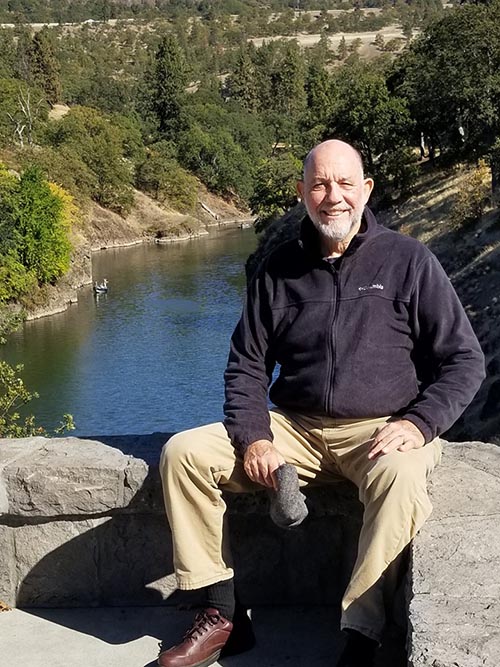Cuttings
Haiku, Short Verses, Epigrams
Quatrains, Couplets, Tercets
Quintains, Tankas, Sequences
By Mike Garofalo
1998-2017: Red Bluff, Tehama County
North Sacramento Valley, California
2017-2025: Vancouver, Clark County,
Columbia River, Washington
Cuttings
Haiku, Short Verses, Epigrams
Quatrains, Couplets, Tercets
Quintains, Tankas, Sequences
By Mike Garofalo
1998-2017: Red Bluff, Tehama County
North Sacramento Valley, California
2017-2025: Vancouver, Clark County,
Columbia River, Washington
Amazon Reviews by Mike Garofalo:
The Tanka Anthology. Edited by Michael McClintock, Pamela Miller Ness, and Jim Kacian. 2023, 240 pages.
Here is my Amazon review: "800 of the best tanka in English by 69 of its finest practitioners. This is an outstanding collection of Tanka poems in the English language. Easy to hold in one's hands, light, compact, good quality print and paper. Very good choices by the highly qualified editors. Most Tanka are in the minimalist style: lowercase, no punctuation, 5 lines. For a paperback, a bit expensive at $34, but worth the higher price. Includes biographies of the authors. No introduction. Good enough for many rereads!"
The Way of Tanka. By Naomi Beth Wakan. Shantee Arts LLC, 2017, 146 pages. $15.00. VSCL.
Here is my Amazon review: "Tanka are brief 5 line poems, typically using 19-33 sound units, uncapitalized, with little punctuation. This is a good brief introduction and guide to the reading and writing of Tanka style poetry. Many fine Tanka are included and briefly analyzed. She provides a few insights into the proper construction of the Pivot Point, Turning Point, the Volta, the Twist, usually in the 3rd line. (I have added more comments on the Pivot Line above.) She emphasizes the importance of a dramatic and surprising phrase in the last 5th line. She makes clear that writing English language haiku cannot follow some Japanese Tanka standards or sensitivities because these two languages have many differences in the sound elements, homonyms, more rhyming in Hiragana, culture, and poetic heritage. The Tanka form has been used since 800 CE in Japan. She includes a few of her longer Tanka sequences. She discusses tanka collage, tanka montage, Haibun, McClintock's Taika, Kyoka tanka wit and humor, minimalist tanka, response/dialogue tankas, Ekphrastic tanka, love tankas, travel/place tanka, diary tanka, tanka strings, nostalgic tanka, tan renga, confessional tanka, and tanka sequences. Japanese terms like wabi, sari, aware - mono no aware, kyojo, makoto, shibusa, and kokora are briefly explained. Ms. Wakan provides a brief bibliography and lists of online resources. She talks about the authors that influenced her. A fine companion to The Tanka Anthology (Edited by McClintlock, Ness, and Kacian, 2023) or Four Decades on My Tanka Road: The Tanka Collections of Sanford Goldstein, 2012."
Four Decades on My Tanka Road: The Tanka Collections of Sanford Goldstein. By Sanford Goldstein. Edited by Fran M. Witham. Preface by Patricia Prime. Winfred Press, 327 pages, Second Edition, 2012.
Here is my Amazon Review: Selections from 6 of Professor Goldstein's books: This Tanka World, 1977; Gaijin Aesthetics, 1983; At the Hut of the Small Mind, 1992; Records of a Well-Polished Satchel, 1995; This Tanka World, 2001; and, Encounters in this Penny World, 2005. Includes a selective bibliography, and a biography of Professor Goldstein. Some introductory notes. Over 500 Tanka in this attractive anthology. Good paper and clear crisp print. $22, Paperback. VSCL. Professor Sanford Goldstein (1925-2023) is often called the "The Grandfather of English Tanka." These Tanka are nearly all in lower case, using only a comma or dash for punctuation, 5 concise lines, mostly free verse style. He includes more gritty, earthy, and intimate aspects of living. These poems reflect many of his experiences while living in Japan for decades. Sometimes, the stark brevity of the Tanka style can lead one to the edge of insight, but they are often too thin to hold up the pants of a deeper understanding."
Haiku - North Sacramento Valley
Exhibits at the Cyber Garden Gazebo: TextArt
At the Edges of the West, Volume 1
At the Edges of the West, Volume 2
Cuttings: Month by Month Snippings
The Raven Broke Open the Magical Clam
Pulling Onions: 1,000 One Liners
Meetings with Master Chang San Feng
Uncle Mike's Cellphone Poetry Series
Fireplace Records Koan Collection
Tao Te Ching: Concordance, Anthology
Zen Buddhist Koans: Research, Indexes
Monthly Observations and Poetry
the scissors of my decisions
more to come ...
Memories of Uncle Mike Short Poems by Michael P. Garofalo
Uncle Mike's Cellphone Poetry Series
Short Poems by Michael P. Garofalo
Uncle Mike's Favorite Short Poems Collections
Uncle Mike's Cellphone Poetry Series
Uncle Mike's Short Poems Collections # 1-5
Short poems by Emily Dickinson,
Maya Angelou, Langston Hughes,
Robert Frost, e.e.cummings,
Odgen Nash, Vikram Seth,
Joyce Kilmer, Michael Burch, etc.
Uncle Mike's Cellphone Poetry Series 2
Short poems by Ezra Pound,
Anais Nin, Sylvia Plath,
Rita Dove, Shakespeare,
William Carlos Williams,
Issa, Mike Garofalo
Uncle Mike's Cellphone Poetry Series 2
Short poems by Mary Frye,
T.S. Eliot, Matsuo Basho,
Dylan Thomas, Sara Teasdale,
Edmund Spencer, etc.
Uncle Mike's Cellphone Poetry Series 2
Short poems by and about Uncle Mike.
By Michael P. Garofalo
Uncle Mike's Cellphone Poetry Series 2
Short poems by Michael P. Garofalo
Uncle Mike's Cellphone Poetry Series 1

Cuttings: Haiku and Short Poems
Pulling Onions: Over 1,000 One-Liners
Green Way Research Subject Index
Uncle Mike's Favorite Short Poems
Uncle Mike's Cellphone Poetry Series
Text, graphics, photos, and webpage design
by Michael P. Garofalo.
Updated: June 23, 2022
© Green Way Research
All Rights Reserved
Short Poems by Michael P. Garofalo
Uncle Mike's
Cellphone Poetry Series
Short Poems by Michael P. Garofalo
Cuttings: Haiku and Short Poems
Pulling Onions: Over 1,000 One-Liners
Uncle Mike's Cellphone Poetry Series
Green Way Research Subject Index